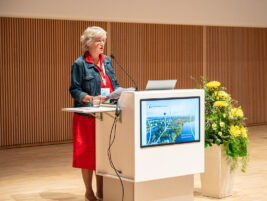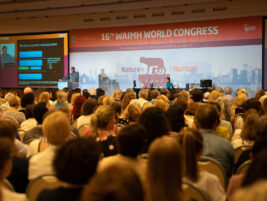Dr. Daniel Schechter is awarded the Sandor Ferenczi Award
Congratulations to Dr. Daniel Schechter who received the Sandor Ferenczi Award from the International Society for the Study of Trauma and Dissociation (ISSTD) at their World Congress on Complex Trauma in New York, earlier in the year.
The award is designated for the best published psychoanalytically-oriented clinical or research paper on trauma and/or dissociation in adults or children. Dr. Schechter is the second recipient of this award named after the early 20th century pioneer in the study of trauma and dissociation, the Hungarian psychoanalyst Sandor Ferenczi.
Daniel S. Schechter, M.D., is the Barakett Associate Professor of Child & Adolescent Psychiatry NYU Langone Health. As of July 2019, he will be back in Switzerland to direct the Perinatal and Early Childhood Ambulatory Consultation at the CHUV in Lausanne and to continue his perinatal and early childhood trauma research. He will remain an Adjunct Associate Professor of Child & Adolescent Psychiatry at NYU Langone School of Medicine.
The details of the paper are as follows:
Daniel S. Schechter (2019). And then there was intersubjectivity: Addressing child self and mutual dysregulation during traumatic play (In memory of Louis Sander). Journal of Psychoanalytic Inquiry, 39:1, 52-65.
Abstract:
This article asserts that a traumatized mother, to maintain her psychobiological homeostasis, must avoid intersubjective connection with a child who is seeking it to regulate his own distress. In this case, what Lou Sander described as a “moment of meeting” cannot take place (Sander, 1995, p. 590). Case examples are used to illustrate how, when all are together in the consulting room, the reflective, mutually regulating therapist can facilitate moments of meeting between therapist, a mother who has been subjected to interpersonal violence, and her child, who has similarly been traumatized. Furthermore, I show how the therapist, in the face of the child’s traumatic re-enactment in play that can further trigger and dysregulate the traumatized parent, can intervene to co-construct meaning, for both the traumatized child and mother, obviating mother’s need to avoid the child’s distress and post-traumatic re-experiencing. This allows meeting to occur, reordering the implicit relational knowing of both mother and child.
The official link to the article is: https://www.tandfonline.com/doi/full/10.1080/07351690.2019.1549911
This paper is second in a series of papers on trauma and intersubjectivity by Dr. Schechter. The first paper also received an award: the Hayman Paper Prize (awarded from the International Psychoanalytical Association in 2015). The details of this paper are as follows: Daniel S. Schechter (2017) On Traumatically Skewed Intersubjectivity, Psychoanalytic Inquiry, 37:4, 251-264, DOI: 10.1080/07351690.2017.1299500
The official link to this article is: https://doi.org/10.1080/07351690.2017.1299500
Authors
Maree Foley, Editor of Perspectives, Switzerland








